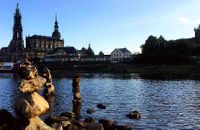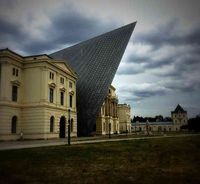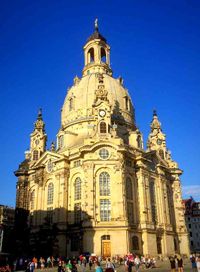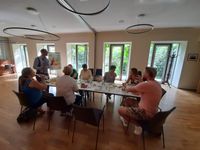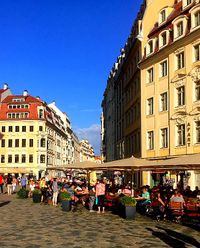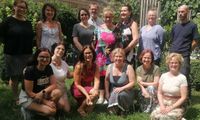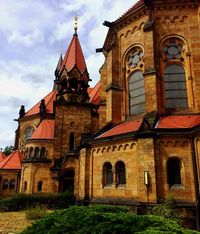Go into the city. Außerschulische Lernorte im Deutschunterricht. Dresden
- in Deutsch siehe unten -
Language must be application-specific if it is to prepare sustainably for life outside. This means that, as a teacher, as much of normal life as possible should be brought into the classroom or that we have to leave the classroom to enter life. Because that which you have experienced yourself, communicated yourself, is what is best remembered.
"Go out of school into the City" is a concept that takes this didactic approach as described. At extracurricular learning locations, students are encouraged to gain experiences then to talk about and reflect on them and finally to make these places their own through connections to their lives and experiences.
This is often much easier and more long lasting than you might think. If you have a few simple guidelines in place, a museum comes to life, a memorial place becomes a place of encounters, or a theatre a fantastical game each paired with many possibilities for expression in German as a foreign language.
The training, led by experienced teachers and educators from the fields of museum, theatre, and memorial places, introduces a technique of developing out-of-school learning venues using specific, student-centred methods. These can also be easily transferred to other extracurricular learning locations such as monuments, churches, mosques and much more.
Content:
1. Pedagogy and didactics of extra-curricular learning places in German as a foreign language.
2. Introduction, testing and reflection of site-specific methods. A single day is dedicated to each of the following three points. Work is done at the various locations.
2.1 Museum Education
2.2 Work at memorial places
2.3 Theatre Education
3. Transfer to your own school situation, target group and conditions on-site.
Outcomes: Participants know the “Go out of the school to the city” as a didactic approach to studentoriented learning.
Participants know specific methods from the areas of museum education, theatre education, and work in memorial sites.
Participants have tried and reflected on example methods.
Participants have developed a vocabulary for specific places and methods.
Participants have used diverse communication possibilities in the German language.
Participants reflect the usage of German language knowledge in their schools and grade levels.
Participants reflect their stance on work in out-of-school learning environments.
Target group: Secondary level I and upper secondary level teachers with German as a foreign language.
City: Dresden is often called "Florence on the Elbe". It has a beautiful old town with magnificent buildings in the picturesque Elbe Valley. The place is steeped in history, with loads to visit and linger at. The many museums abound with artful treasures. The city hosts the Semperoper, one of the most prestigious opera houses worldwide.
Setting: Theatrical performance, socializing and much more.
Date:
07.04.-11.04.26: 5 days (book now)
06.07.-10.07.26: 5 days (book now)
21.10.-25.10.26: 5 days (book now)
Number of participants:
4-12 persons
Language: German
Level: B2 - C1
Cost: Course fee: € 400
Administration fee: € 50
Lodging: The seminar is happy to reserve accommodation in the historic center of Dresden directly on the Elbe, within walking distance to the Frauenkirche.
Did we spark your interest? Pre-register you now!
- in Deutsch -
Sprache muss anwendungsspezifisch sein, wenn sie nachhaltig für das Leben draußen vorbereiten soll. Das bedeutet konsequenter Weise, dass von uns als Lehrer möglichst viel aus dem normalen Leben in das Klassenzimmer gebracht werden sollte oder aber dass wir das Klassenzimmer verlassen müssen, um uns so in das Leben zu begeben. Denn was man selbst erlebt hat, selbst kommuniziert hat, das bleibt am Besten im Gedächtnis haften.
„Raus aus der Schule und hinein in die Stadt“ ist ein Konzept, dass sich diesem didaktischen Ansatz verschrieben hat. An Außerschulischen Lernorten sind die Schüler gefordert Erfahrungen zu machen, darüber zu reden und zu reflektieren und sich so diese Orte mit ihren Begrifflichkeiten, Geschichte und Erlebnissen anzueignen.
Das ist oft viel einfacher, viel nachhaltiger als man meinen könnte. Wenn man ein paar kinderleichte Regeln beachtet, wird ein Museum lebendig, eine Gedenkstätte ein Ort der Begegnung oder ein Theater ein phantastisches Spiel gepaart mit vielfachen Ausdrucksmöglichkeiten in Deutsch als Fremdsprache.
Die Fortbildung, geleitet von erfahrenen Lehrern und Pädagogen aus den Bereichen der Museums- und Theaterpädagogik, führt ein in Technik der Erschließung Außerschulischer Lernorte mithilfe spezifischer, schülerorientierter Methoden. Diese lassen sich im Anschluss auch sehr einfach auf andere Außerschulische Lernorte wie Monumente, Kirchen, Moscheen und vieles mehr anwenden.
Inhalt:
1. Pädagogik und Didaktik Außerschulischer Lernorte im Fach Deutsch als Fremdsprache.
2. Einführung, Erprobung und Reflexion ortsspezifischer Methoden. Den drei Schwerpunkten ist jeweils ein Tag gewidmet. Gearbeitet wird an den verschiedenen Orten.
2.1 Museumspädagogik
2.2 Arbeit an Gedenkstätten
2.3 Theaterpädagogik
3. Übertragung auf die eigene Schulsituation, Zielgruppe und Gegebenheiten vor Ort.
Zielgruppe: Lehrer der Sekundarstufe I und Sekundarstufe II mit Deutsch als Fremdsprache.
Stadt: Dresden wird gerne als „Elbflorenz“ bezeichnet. Es hat eine wunderschöne Altstadt mit herrlichsten Bauten im malerischen Elbtal zu bieten. Der Ort ist geschichtsträchtig, lädt zum Besichtigen und Verweilen ein. Die vielen Museen bergen kunstvolle Schätze. Mit der Semperoper verfügt die Stadt über eins der renommiertesten Opernhäuser weltweit.
Rahmen: Theatervorstellung, geselliges Beisammensein und vieles mehr.
Termine:
07.04.-11.04.26: 5 Tage (für Buchung freigegeben)
06.-07.-10.07.26: 5 Tage (für Buchung freigegeben)
21.10.-25.10.26: 5 Tage (für Buchungen freigegeben)
Anzahl an Teilnehmern:
4 - 12 Personen
Sprache: Deutsch
Sprachniveau: B2 - C1
Kosten:
Kursgebühr: 400 €
Verwaltungsgebühr: 50 €
Unterbringung: Das Seminar reserviert gerne eine Unterkunft in der Altstadt von Dresden direkt an der Elbe, fußläufig zur Frauenkirche.
Stimmen aus den letzten DaF-Fortbildungen:
"Eine wunderbare Gelegenheit Deutsch-Lehrer aus anderen Ländern kennenzulernen!"
"Die Woche verflog wie im Nu, weil unser Trainer, die Kollegen, die Thematik, die Orte einfach genial waren!"
"Es war ein Vergüngen!"
Haben wir Ihr Interesse geweckt? Dann lassen Sie sich noch heute vormerken!
